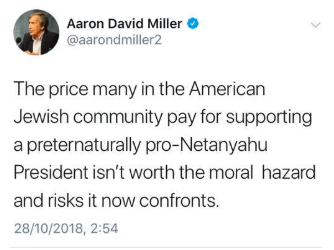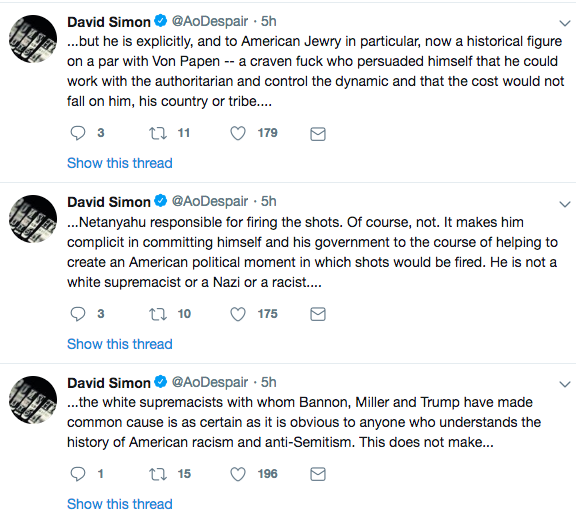In the wake of the Pittsburgh synagogue massacre many people reacted with anger and emotion. In the political environment of the US many latched on to the first person they could think to blame: Trump. But that didn’t last long, because Trump was a relatively easy target. Then they began looking for other scapegoats. Among many commentators the next target became Jewish Americans and then Israel.
How Iran Hides Its Oil Tankers: Meet The Team Tracking A Hidden Trade
This was odd, considering that Jewish Americans were the victims of the Pittsburgh massacre. It was the worst targeted killing of Jews in US history. One might pause and focus on the perpetrator and the victims. But social media doesn’t encourage reflection, it encourages quick visceral reactions that tend towards a kind of echo chamber of increasingly extreme voices. There is also still a very shallow understanding of social media among popular and powerful users. People tend to think that Twitter is a kind of bathroom stall where you can shout and write on the walls, but people don’t *really* see you. Maybe they come later and see the writing or they hear the shouting from another stall, but they have no idea who is doing it. But Twitter is actually a bathroom stall without any walls with the whole world watching. Many celebrities, some journalists and even academics and former diplomats still think that they can choose their words without grace, and that what they say will not have much of an impact. In doing so after the Pittsburgh attack, when what was called for was more calm and concerted decent reactions, and rage against the perpetrator and antisemitism, a tragedy unfolded of harsh comments directed at the wrong targets
Here are some of them.
“The embassy move” and Pittsburgh
Julia Ioffe’s tweet on October 27 sought to highlight “American Jews,” who she addressed it to. Of course her 200,000 followers surely include more people than that small minority. Nevertheless she went on to claim that the “president makes this possible,” meaning that Trump made the Pittsburgh attack possible. She said this horror was happening here. So far, this was a kind of natural political reaction to this, arguing that Trump’s rhetoric was fanning the flames of extremism. She had once written an article on Melania Trump and received vile hatred in return. But she had also tweeted in December 2016 “either Trump if ****ing his daughter or he’s shirking nepotism laws,” showing a bizarre obsession with Trump’s family.
But in her October 27 tweet she asked whether the “embassy move over there, where you don’t live was worth it,” implying that American Jews, who she had addressed, had somehow felt the embassy was more important than their own security. The “worth it” was clear. Did it mean that somehow antisemitism in the US was a tradeoff for the embassy move? The implication was that American Jews had supported Trump, when in fact Jews were one of he groups least likely to vote for Trump. And Trump in 2016 had promised to move the embassy just as Obama and Bush and others had.
The “Jewish enablers”
Then there were a chorus of voices arguing that it was time to “shun Jewish enablers.” These enablers were named and shamed, including Sheldon Adelson, Jared Kushner, and others. The attack on “Jews who enable Trump,” targeted Jewish Americans, as Ioffe had. “Any strategy for enhancing the security of American Jewry should involve shunning Trump’s Jewish enablers too,” wrote Franklin Foer (82,000 followers) at The Atlantic. “Their money should be refused, their presence in synagogues not welcome.” He argued that “they have placed their community in danger.” This was part of a trend of singling out Jews in the Trump administration for targeting, and then claiming they were to blame somehow for the anti-semitism in the US. The idea was that they had “enabled” Trump. Stephen Miller has been one target, but so have others. The insinuation, like classic anti-semitism, is that wherever a Jew is, he or she always is a “Jew” first. Therefore any Jews in the Trump administration are singled out as “Jews” and shamed as “Jews” and then called “Jewish enablers.”
Targeting “white Jews”
After singling out “enablers” and blaming the attack on a trade off for the embassy move, there were some who sought to highlight the “white” Jews. It appears this is a sort of dog whistle for targeting Jewish Americans as part of the “white majority” as opposed to “people of color.” This is a running debate in the US regarding Jewish “whiteness,” but after Pittsburgh some people sought to draw contrasts. Chanda Prescod-Weinstein, an academic, tweeted “I hope white Jews who are feeling especially unsafe today realize that Black people feel vulnerable like this all the time.” She then claimed that “we are born into it. Allow your grief to teach you empathy and move you to pursue justice and an end to the violence that is whiteness.” The names of the victims had not been released when she tweeted, but she sought to single out “white Jews.” Another commenter singled out “white Ashkenazi folks” and sought to remind them, even as 11 victims had just been killed, “we are never the only community targeted.”
The “price” we pay
Former diplomat Aaron David Miller (28,000 followers) highlighted the attack as “the price many in the American Jewish community pay for supporting a preternaturally pro-Netanyahu President.” The dat after the attack he asserted that it “isn’t worth the moral hazard and risks it now confronts.” In short he sought to link “American Jewish community” for “supporting” the president and a pro-Netanyahu stance, with the risks that apparently meant Pittsburgh and growing antisemitism. Indeed antisemitism has been growing greatly in the US over the last two years since the 2016 election.
But what does this have to do with Netanyahu? And American Jews don’t generally support Trump or Netanyahu. A survey released in October just a week before the massacre noted “only 6% say Trump’s Israel policy will cause them to consider voting for him.” An article on the survey noted: “The survey, conducted by the Mellman Group and the Jewish Electorate Institute earlier this month, found that Jewish American support for Trump remains at a dismal 23% – and that 74% plan on voting for his Democratic opponent in 2020 regardless of the candidate.” So why did Miller imply that this was a price paid by the community for supporting Trump and a pro-Netanyahu policy?
“American Jewish community is now bleeding at the hands of the Israeli prime minister.”
American journalist and producer David Simon (214,000 followers) argued that “Netanyahu’s interventions in US politics aided in the election of Donald Trump.” he then went on to assert that “the American Jewish community is now bleeding at the hands of the Israeli prime minister.” No mention of the actual perpetrator of the crime, who actually opposed US support for Israel and believed a “Zionist Occupation Government” controls America. The perpetrator of the attack, Robert Bowers, seems to have agreed that Israel was the problem. He reposted articles attacking Israel, the embassy move and Israel’s right leaning government which he said was not taking in refugees at a time when American Jews were helping refugees.
So how did Netanyahu fuel the perpetrator? It’s not clear. But this concept was explored by Tom Arnold as well who had a different take. He argued that people who sit in Israel “do Trump’s dirty work for him.” What that meant was unclear, but it also hinted at an Israel connection.
Simon had more to say on the Netanyahu issue. He compared Netanyahu to Von Paper, the last Chancellor of Germany before Hitler rose to power. He argued that Netanyahu was “complicit in committing himself and his government to the course of helping to create an American political movement in which shots would be fired.” So this placed Netanyahu as somehow responsible for the rise of American populism and support for Trump. He called Netanyahu as “craven f*** who persuaded himself that he could work with the authoritarian and control the dynamic and that the cost would not fall on him, his country or tribe.” It wasn’t clear what “tribe” was meant here. But the concept was that somehow Netanyahu had some role in “control” and that one again American Jews were paying the “cost.”
A Jewish conversation after Pittsburgh
After the massacre there has been a series of quick attempts to articulate feelings. Many of these are feelings of anger at the Trump administration by people who despise the administration and were quick to see the massacre as a result of its rhetoric. But they didn’t stop at blaming the rhetoric. They went further. They brought up the embassy move and then singled out Israel and asserted that American Jews support Trump (which they do not) and that support for Trump had enabled the attack and that this was a kind of “price” paid for the support. In this sense the victims became part of the crime. Anti-semitism became less central. But Netanyahu and Israel took a more center stage. This was strange. Where was the rage at the perpetrator? Where was the grieving for the victims? There was little rage at others on the forum that helped fan the flames of . the perpetrator’s actions. Instead a talking point was raised that pointing a finger at Trump and then at Israel.
This shows the unfortunate aspect of channeling anger and rage into social media. Social media can seem like he darkness you want to shout into. It can seem like a place to let the rage out and then behave normally face-to-face. Its a large void to shout into. It’s stream of consciousness. And sometimes in the anger of a stream of thoughts we say things that we don’t mean or put together and link things that don’t make sense. It’s easy sometimes in the Jewish community to think one is mostly talking to other Jews. The message in many of these tweets was indeed, just that. But there isn’t a special “Jewish twitter” where potentially offensive tweets that might seem acceptable in an entirely Jewish setting and could be debated takes place. There is just regular Twitter and on it these kinds of toxic reactions, talking about “Jewish enablers” and claiming the problem is Netanyahu, send a message.
What do antisemites think? They see the attack and then they see blame placed on Trump, and then on Netanyahu and then on “Jewish enablers.” For them this must be a bit ironic, since they also also dislike Israel, they think “Zionists” are nefarious and they also despise Jews in the Trump administration. So for them to see Pittsburgh and then see blame cast on Netanyahu must be the best of both worlds. A horrid hate crime and blame is put on Israel and Jewish politicians. No one comes to confront the antisemites and haters who just keep on moving. For this reason it’s important to think more deeply about these reactions and try to learn something from the worst targeted mass murder of Jewish in US history. Let’s start by not making it about Israel, since it’s not. And let’s stop manipulating audiences by arguing that Jews supported Trump, since as a community they did not.







